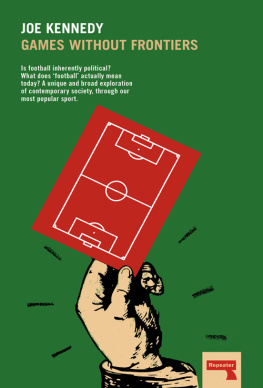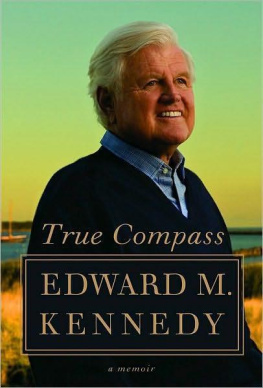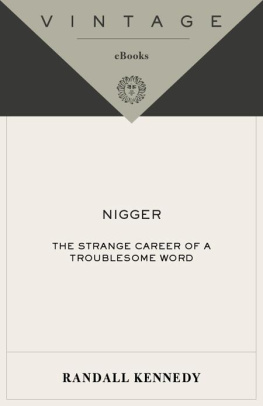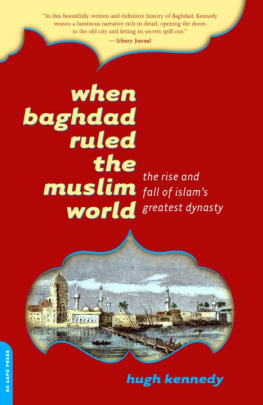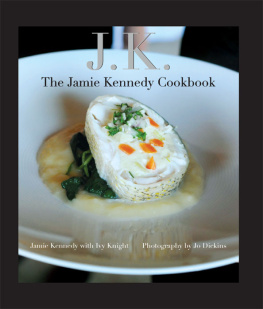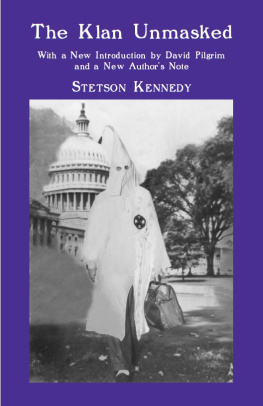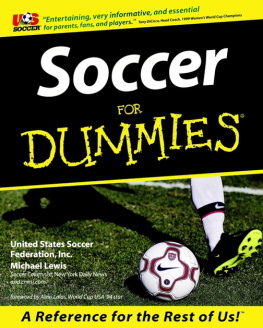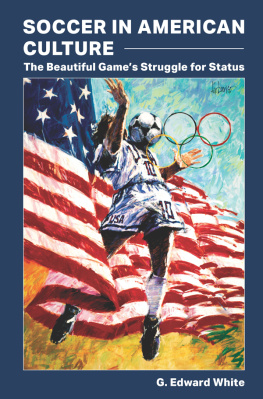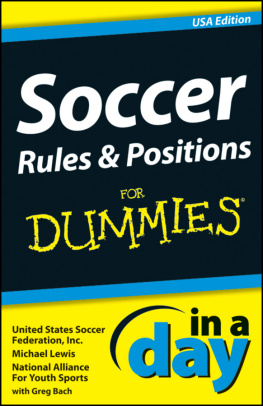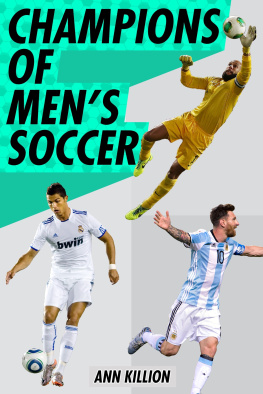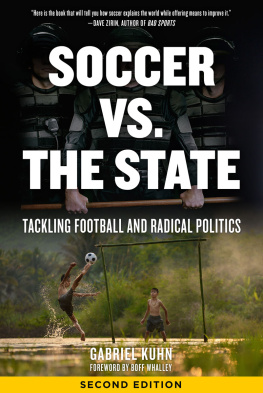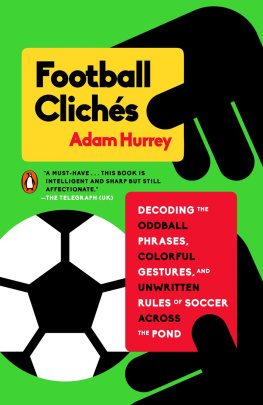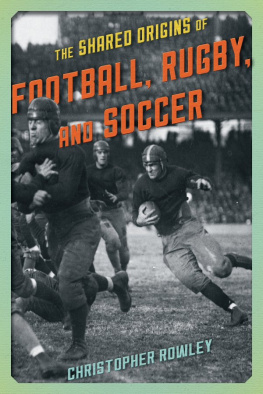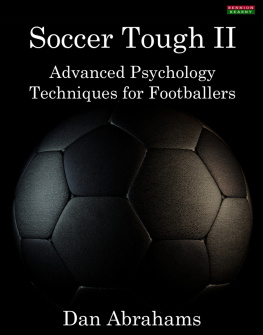Games without Frontiers
Games without Frontiers
Joe Kennedy

CONTENTS
Introduction
There is an anecdote told widely within British football culture which I believe is true when applied to one individual, and suspect is apocryphal in its many other applications. As far as I know, the verified example attaches itself to Len Shackleton, who played for Bradford Park Avenue, Newcastle and, most famously, for Sunderland in the English games post-World War II Golden Age. In Shackletons 1956 autobiography, The Clown Prince of Soccer, apparently, there is a chapter with the perhaps deliberately unwieldy title The Average Directors Knowledge of Football. The rest of the page, or the following page, depending on whos telling the story, is completely blank.
Ive no desire to explain the joke, largely because it shouldnt require explaining, but is it at all possible that Shackleton was, consciously or unconsciously, making a point other than the obvious one here? Isnt there another way of interpreting what seems to be a throwaway literary sight-gag? Given the story of how football clubs have been owned, and what footballs owners have done with clubs, since the halcyon days of Shackleton, Jackie Milburn, Stanley Matthews and Tom Finney, isnt it apparent that what the average director and what a quaint, sepia-tinted term director now seems really knows about football is that it, thrillingly and worryingly, lacks intrinsic meaning? By this, I mean that football means nothing whatsoever in its own right, which of course makes it into the ideal vehicle for any number of superimposed meanings.
This is certainly the case not least for those owners and directors who have, over the decades, seen football clubs as: instruments of civic and commercial leverage, concentrations of material stuff awaiting asset-stripping, objects of juvenile fantasy, sources of wealth from television and merchandise, and most notably in the last ten years political launderettes. Football means something very different for a Middle Eastern petrogarch buying a Premier League side and a South London property developer who purchases a non-league club in order to realise his vision of a Sainsburys on the site of their ground. That said, in neither case does the game as such really enter the equation.
This is, however, only one part of a far broader antagonism between the game described by the rules and the almost infinitely variable financial, emotional and political investments that are made in its name. From the very first time that you walk into a football ground, you are aware of the way in which the match is at best a single component of, and in some cases utterly peripheral to, the thing we unreflectively call football. Speaking as a fan and a (not sensationally good) player of almost three decades experience, what strikes me now is how central football has been not only to my understanding of more or less obviously related fields such as politics, history and economics, but also of areas which seem logically separate: literature, music, philosophy, critical theory. As a literature undergraduate at the then still theory-heavy University of East Anglia, my response to an essay task requiring a study of Roland Barthes ideas about narrative analysis was to illustrate these in relation to the 1970 World Cup final. It was fair payback: the reason literature, particularly of the demonstratively experimental sort, was my subject was at least in part to do with my introduction to various culty authors (Burroughs, Kafka, Ballard, Kerouac, Beckett) via football fanzines in the mid-1990s. I was completely unsurprised later on to find out how many theorists amongst them Jacques Derrida, Umberto Eco and Antonio Negri were football fans.
That said, I never expected to write a book about football: while I was completing my PhD on wartime British modernism I played as many as three times a week and attended matches reasonably regularly, but predominantly in the name of relieving tension and boredom. It wasnt until a couple of years later, lacking an academic post and living brokely in Boris Johnsons ever-more homogenously bourgeois London that I started to think with any degree of rigour about how football locked into contemporary political formations, and whether or not it could be a site of resistance to neoliberal dominance in spite of the clear influence of neoliberalism at various levels of the game. Nevertheless, I found all too often that I was spending the time in which I could have been putting these ideas to paper going to football and becoming increasingly involved in supporter activism. Naturally, this meant a constant series of fluctuations and modulations in what I thought (or what I thought I thought) about the game. The biggest of these, I believe, was a progression from regarding football, or some football, as the site of a dubiously defined politics of authenticity to a position in which it became an arena in which authenticity became subject to conceptual collapse.
As a result, the approach I took to writing this book bifurcated between essays attempting a theoretical, albeit hopefully not grindingly academic, intervention into football and football culture, and accounts of particular matches that prompted some of the shifts in thinking I mention above. Inevitably, this leads to a certain unevenness of tone, although Id argue in my defence that football itself is tonally inconsistent, given that it is the sum of all the instances in which a remarkably simple sport encounters its non-sporting outside. Derrida, who fantasised about becoming a professional footballer while a child in French Algeria, was surely being flippant or provocative when he claimed beyond the touchline, there is nothing. Football looks like twenty-two people kicking a ball about on a small patch of grass, or plastic, but it is absolutely not only, and not even mainly, this.
What Ive attempted here, then, is a study of what football implies at a particular moment in (predominantly) British history. There are four travelogues, arranged in chronological order so as to be roughly contemporary with the theoretical development of the four essays, which can be described as follows. The first looks at the time-sense of football, noting that our experience, and perhaps our enjoyment, of the game is melancholy, arranged around a sense of loss. This is contextualised through a reading of early footballs historical simultaneity with the development of modernist aesthetics: both, I argue, trace the dematerialising, melting effects of industrial capitalism noted by Marx and Engels in a famous passage in The Communist Manifesto. Closing the circle, I then look at works of literature which have used football as a structural metaphor for a modernist or avant-garde poetics. Football, I claim here, should be considered a form of popular modernism, potentially possessive of all the radical cachet that implies. My second essay considers the ideological position occupied by football players in the early 21st century, regarding this in the light of contemporary militarism and popular discourses of passion and commitment. I then proceed to look at the gap which yawns between these discourses and the lived reality of being a footballer, particularly for the majority of players who constitute a reserve army of precarious labour mirroring that to be found in neoliberal society at large.
In the third essay, I begin by thinking about the attempts to eliminate error from football in the form of goal-line technology and video refereeing. This proceeds into a discussion of the sports increasingly sophisticated representation in video games, and how such games attempt to simulate the contingencies which simultaneously attract us to football and draw our attention to the
Next page
